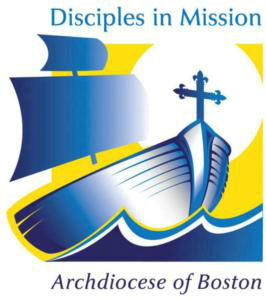Missionary perspective
"Missionary Zeal" and "Small Groups" are two of the seven traits of an amazing parish referenced in past Disciples in Mission articles. A missionary priest talks about parish life in the Church of Zambia where small groups and zeal exist in abundance.
Father Bernard Makadani Zulu, National Director of the Pontifical Mission Societies of Zambia and a member of the Superior Council in Rome, visited the Boston area some months ago and spent time at the Phase I Lynn Collaborative of Sacred Heart and St. Mary Parishes. Father Bernard was present for weekend liturgies, travelling between both parishes, and had a glimpse of Disciples in Mission being lived out. The observations of someone very much outside of our context provides an interesting perspective on what this archdiocese is doing in the area of pastoral planning.
Father Bernard quickly grasped the concept of the collaborative model: each parish is a separate entity with a shared administration (appointed leadership: pastor, parochial vicar, and permanent deacon; and collaborative leadership team). Although this is a new model for us, a similar model is standard practice in Zambia -- minus the permanent deacons (there are none in Zambia).
Parish structure and the level of lay involvement in Zambia are eye-opening. In rural Zambia a parish may have two priests assigned, but also have 20 "outstations." An outstation could be 60 miles from the parish site and one parish might stretch over 600 miles (the Cranberry Collaborative -- Lakeville, Middleborough, Rochester -- looks small by comparison!) The priest visits each outstation only a couple of times a year. Outstations are further divided into small Christian communities -- neighborhoods; each has a minimum of 25 families, each has a chairperson. These communities focus on prayer and Scripture. According to Father Bernard, you cannot talk about the Church in Zambia without talking about small Christian communities. The Zambian Church relies heavily on committed and formed lay people. Father Bernard refers to this as the animation of the laity and sees it as integral to the success of the pastoral plan in the Archdiocese of Boston.
In the United States, the term catechist usually refers to a layperson who passes on the faith in a parish religious education program with youngsters or adults, or in a Catholic school. In Zambia, the word catechist refers to lay men and women who provide pastoral care and home-based programs as well as faith formation. The preparation program is two years long and takes place at a regional Formation Center. In addition to learning about the faith, there is instruction in nutrition, agriculture, budgeting, and bicycle repair. HIV/AIDS is still a huge problem, so catechist formation also includes training in palliative care. The catechist and his or her entire family moves to the Formation Center and lives there for the two years. At the conclusion of the formation program, the catechist is commissioned. Father Bernard emphasizes that catechists are people who "represent the mind and heart of the Church in a clear way."
Zambia is a mostly agricultural economy and Catholics are expected to donate to the Church annually a certain amount of what they have grown. The Church sells the crops, using the proceeds to "enhance the pastoral care to all people." Catechists are given a token stipend of $100 a month. Their operating principle is, "there is no one who is too rich that he cannot receive or too poor that he cannot give."
Father Bernard notes that our archdiocese is experiencing, "a real paradigm shift. Aggregating personnel instead of closing parishes is not easy. It demands work and people must be ready to work hard." He saw this in Lynn and observes similarities between the Zambian model and our archdiocesan pastoral plan, even though the contexts are different. Zambia is a "communion of communities, sharing talents and skills."
The Church in Zambia is in a very poor part of the world yet it is growing rapidly. The increase in well-formed laity out-paces ordinations, but not because of a lack of vocations. In fact, young men are turned away from the seminaries and women from convents because of lack of space and trained personnel to teach. In true missionary fashion, Father Bernard leaves us with this message about missionary zeal: "Sharing the Good News is not cosmetic. It is not an appendage. It is essential. It is fundamental. By virtue of our baptism we are all missionaries.
(For more information about the work of the Propagation of the Faith and the St. Peter Apostle Society, visit www.propfaithboston.org.)
SUSAN ABBOTT IS COORDINATOR OF PARISH OUTREACH FOR THE ARCHDIOCESE OF BOSTON'S OFFICE OF PASTORAL PLANNING.
- SUSAN ABBOTT IS EVANGELIZATION ASSOCIATE, OUR LADY OF GOOD VOYAGE SHRINE.



















